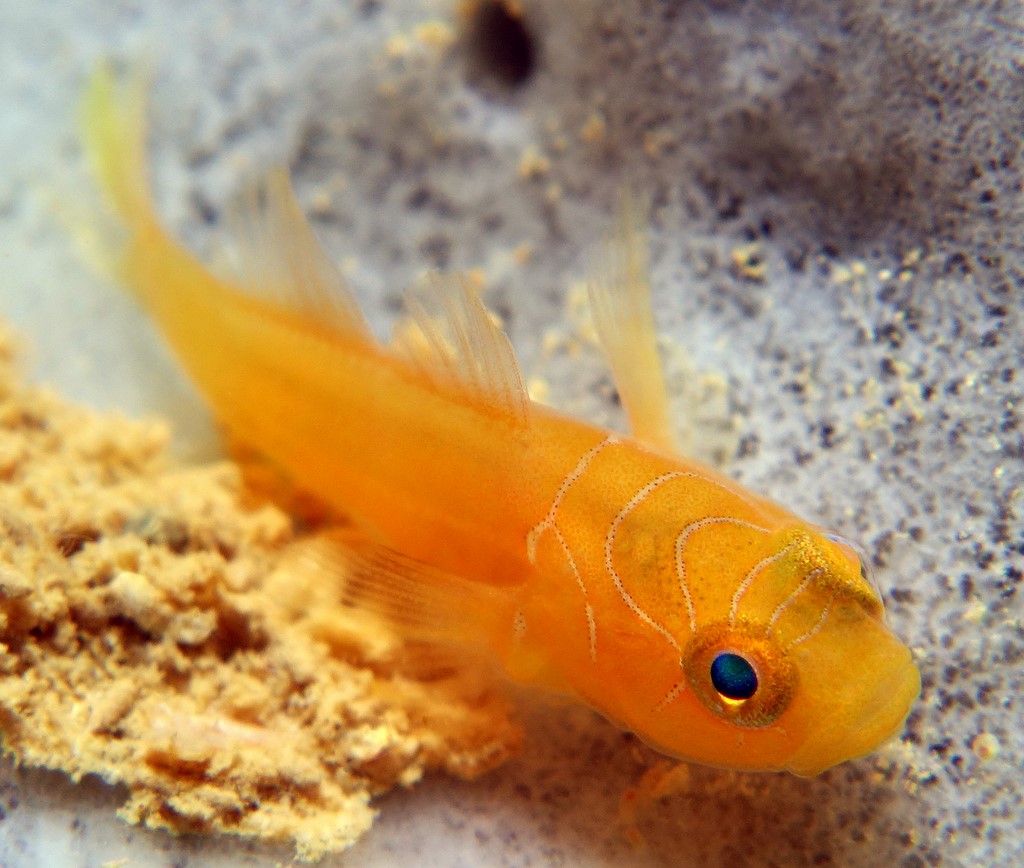LUBRICOGOBIUS ORNATUS - (FOURMANOIR, 1966)
Picture courtesy of: Yves Thévenet
Actinopterygii (Gigaclass) > Actinopteri (Class) > Teleostei (Subclass) > Gobiiformes (Order) > Gobioidei (Suborder) > Gobiidae (Family) > Gobiinae (Subfamily) > Lubricogobius (Genus)
Gobie orné, Ornate goby, Ornate slippery goby, Irezumi-mijn-benihaze, イレズミミジンベニハゼ, 飾妝裸葉鰕虎魚, 饰妆裸叶鰕虎鱼,
Description
Dorsal spines (total): 7; Dorsal soft rays (total): 8-10; Anal spines: 1; Anal soft rays: 6-7; Pectoral fin rays: 20; Body depth: 2.9-3.9 in SL. Anterior nostrils present; Dorsal and ventral edges of caudal peduncle not keeled; Caudal fin rounded; United pelvic fins with well-developed frenum; Absence of scales on head or body; No sensory pores on head, prominent papillae. Max length: 3.4 cm SL. Depth range: 15 - 80 m.
Color
Orange with pale blue lines radiating from eye and one descending from nape, dividing onto the preopercular margin and opercle.
Etymology
Lubricogobius: from Latin, lubricus = slipperiness, smoothness + from Latin, gobius = gudgeon. Referring to absence of scales.
ornatus: from Latin, orno = adorned, decorated. Referring to its coloration.
Original description: Lubricogobius ornatus Fourmanoir, 1966 - Type locality: Nha-Trang market, Vietnam.
Distribution
Indo-West Pacific: Indonesia, Philippines, south to Australia and New Caledonia, north to Ryukyu Islands (Japan).
Biology
Inhabits sand, silt, and rubble bottoms, takes refuge in dead shells, worn tubes, tunicates and empty bottles. Sponge associate, often taken in trawls.
Similar species
Actinopterygii (Gigaclass) > Actinopteri (Class) > Teleostei (Subclass) > Gobiiformes (Order) > Gobioidei (Suborder) > Gobiidae (Family) > Gobiinae (Subfamily) > Lubricogobius (Genus)
Gobie orné, Ornate goby, Ornate slippery goby, Irezumi-mijn-benihaze, イレズミミジンベニハゼ, 飾妝裸葉鰕虎魚, 饰妆裸叶鰕虎鱼,
Description
Dorsal spines (total): 7; Dorsal soft rays (total): 8-10; Anal spines: 1; Anal soft rays: 6-7; Pectoral fin rays: 20; Body depth: 2.9-3.9 in SL. Anterior nostrils present; Dorsal and ventral edges of caudal peduncle not keeled; Caudal fin rounded; United pelvic fins with well-developed frenum; Absence of scales on head or body; No sensory pores on head, prominent papillae. Max length: 3.4 cm SL. Depth range: 15 - 80 m.
Color
Orange with pale blue lines radiating from eye and one descending from nape, dividing onto the preopercular margin and opercle.
Etymology
Lubricogobius: from Latin, lubricus = slipperiness, smoothness + from Latin, gobius = gudgeon. Referring to absence of scales.
ornatus: from Latin, orno = adorned, decorated. Referring to its coloration.
Original description: Lubricogobius ornatus Fourmanoir, 1966 - Type locality: Nha-Trang market, Vietnam.
Distribution
Indo-West Pacific: Indonesia, Philippines, south to Australia and New Caledonia, north to Ryukyu Islands (Japan).
Biology
Inhabits sand, silt, and rubble bottoms, takes refuge in dead shells, worn tubes, tunicates and empty bottles. Sponge associate, often taken in trawls.
Similar species
- Gobiodon citrinus (Rüppell, 1838) - Reported from New Caledonia - Link to the species (here). Has blue and white facial markings.
- Gobiodon okinawae (Sawada, Arai & Abe, 1972) - Reported from New Caledonia - Link to the species (here).
- Larsonella pumilus (Larson & Hoese, 1980) - Reported from Indo-West Pacific: Somalia, Seychelles, northwest Australia to Okinawa, Japan. Body and all fins yellow or yellowish orange. Depth range: 50 - 400 m.
- Lubricogobius exiguus (Tanaka, 1915) - Reported from Western Pacific: Indonesia; Japan. Dorsal and ventral edges of caudal peduncle strongly keeled; Bright yellow in color.
Last update: 12, May 2022
